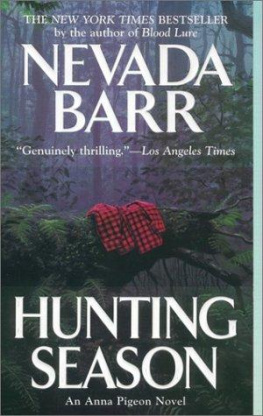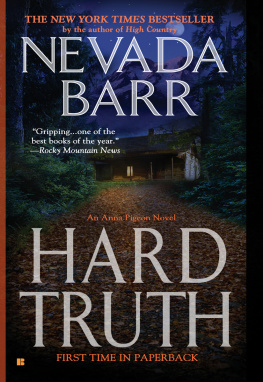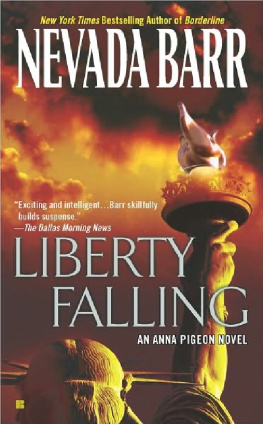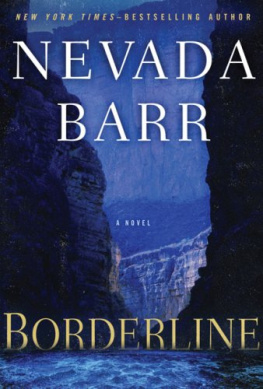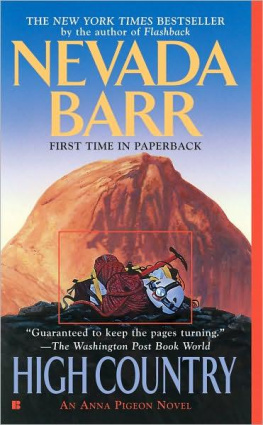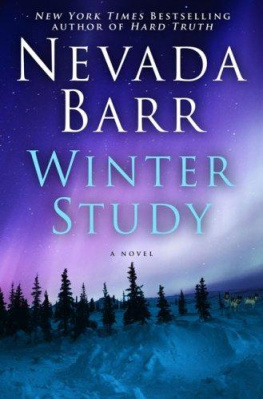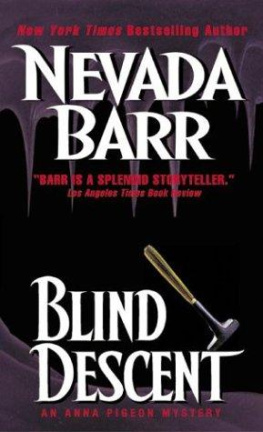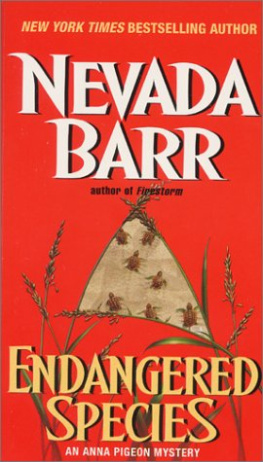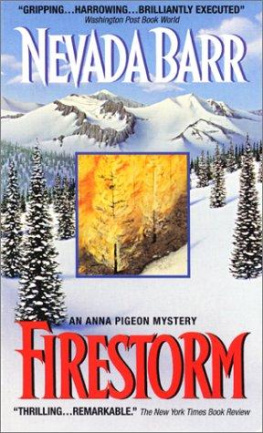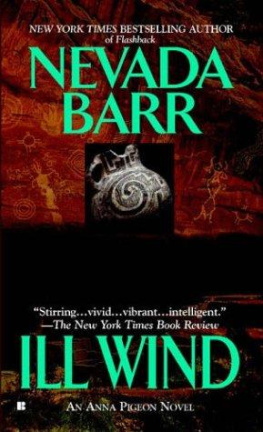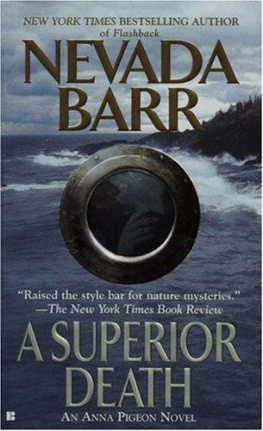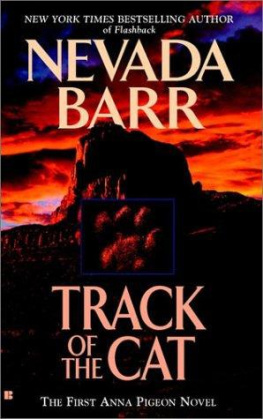Nevada Barr - Anna Pigeon 11 Flashback
Here you can read online Nevada Barr - Anna Pigeon 11 Flashback full text of the book (entire story) in english for free. Download pdf and epub, get meaning, cover and reviews about this ebook. year: 2004, publisher: Berkley, genre: Non-fiction. Description of the work, (preface) as well as reviews are available. Best literature library LitArk.com created for fans of good reading and offers a wide selection of genres:
Romance novel
Science fiction
Adventure
Detective
Science
History
Home and family
Prose
Art
Politics
Computer
Non-fiction
Religion
Business
Children
Humor
Choose a favorite category and find really read worthwhile books. Enjoy immersion in the world of imagination, feel the emotions of the characters or learn something new for yourself, make an fascinating discovery.
- Book:Anna Pigeon 11 Flashback
- Author:
- Publisher:Berkley
- Genre:
- Year:2004
- Rating:3 / 5
- Favourites:Add to favourites
- Your mark:
- 60
- 1
- 2
- 3
- 4
- 5
Anna Pigeon 11 Flashback: summary, description and annotation
We offer to read an annotation, description, summary or preface (depends on what the author of the book "Anna Pigeon 11 Flashback" wrote himself). If you haven't found the necessary information about the book — write in the comments, we will try to find it.
Anna Pigeon 11 Flashback — read online for free the complete book (whole text) full work
Below is the text of the book, divided by pages. System saving the place of the last page read, allows you to conveniently read the book "Anna Pigeon 11 Flashback" online for free, without having to search again every time where you left off. Put a bookmark, and you can go to the page where you finished reading at any time.
Font size:
Interval:
Bookmark:
Nevada Barr - Anna Pigeon 11 - Flashback
HISTORICAL NOTE
In 1865, Dr. Samuel Mudd was tried and convicted for aiding and abetting John Wilkes Booth after the assassination of President Lincoln. He received a sentence of life imprisonment to be served at Fort Jefferson in the Dry Tortugas, Florida. Two years later, during a yellow fever outbreak at the prison, Dr. Mudd acted courageously, using his medical skill to treat the sick. Acknowledging his services, President Andrew Johnson pardoned him in 1869. Though there has been a great deal of discussion over Dr. Mudd's guilt or innocence, the device of the doppelganger was a complete fiction created for this story.
A month after Dr. Mudd was pardoned, Samuel Arnold's case was reviewed. President Johnson found there was sufficient doubt about his participation in the conspiracy to pardon him as well. After his release, Mr. Arnold lived a quiet life of seclusion on his farm in Maryland. In 1906, at the age of 72, Samuel Arnold died of consumption at his home. His wife and children were at his bedside.
Throughout their lives, both men maintained their innocence of any crime connected with the death of Mr. Lincoln.
Until she ran out of oxygen, Anna was willing to believe she was taking part in a PBS special. The water was so clear sunlight shone through as if the sea were but mountain air. Cloud shadows, stealthy and faintly magical at four fathoms, moved lazily across patches of sand that showed startlingly white against the dark, ragged coral. Fishes colored so brightly it seemed it must be a trick of the eye or the tail end of an altered state flitted, nibbled, explored and slept. Without moving, Anna could see a school of silver fish, tiny anchovies, synchronized, moving like polished chain mail in a glittering curtain. Four Blue Tangs, so blue her eyes ached with the joy of them, nosed along the edge of a screamingly purple sea fan bigger than a coffee table. A jewfish, six feet long and easily three hundred pounds, his blotchy hide mimicking the sun-dappled rock, pouting lower lip thick as Anna's wrist, lay without moving beneath an overhang of a coral-covered rock less than half his size, his wee fish brain assuring him he was hidden. Countless other fish, big and small, bright and dull, ever more delightful to Anna because she'd not named them and so robbed them of a modicum of their mystery, moved around her on their fishy business.
Air, and with it time, was running out. If she wished to live, she needed to breathe. Her lungs ached with that peculiar sensation of being full to bursting. Familiar desperation licked at the edges of her mind. One more kick, greetings to a spiny lobster (a creature whose body design was only possible in a weightless world), and, with a strong sense of being hounded from paradise, she swam for the surface, drove a foot or more into the air and breathed.
The sky was as blue as the eye-watering fishes and every bit as merciless as the sea. The ocean was calm. Even with her chin barely above the surface she could see for miles. There was remarkably little to soothe the eye between the unrelenting glare of sea and sky. To the north was Garden Key, a scrap of sand no more than thirteen acres in total and, at its highest point, a few meters above sea level. Covering the key, two of its sides spilling out into the water, was the most bizarre duty station at which she had served.
Fort Jefferson, a massive brick fortress, had been built on this last lick of America, the Dry Tortugas, seventy miles off Key West in the Gulf of Mexico. At the time construction started in 1846, it was the cutting edge of national defense. Made of brick and mortar with five bastions jutting out from the corners of a pentagon, it had been built as the first line of defense for the southern states, guarding an immense natural-and invisible-harbor; it was the only place for sixty miles where ships could sit out the hurricanes that menaced the Gulf and the southeastern seaboard or come under the protection of the fort's guns in time of war. Though real, the harbor was invisible because its breakwaters, a great broken ring of coral, were submerged.
Jefferson never fired a single shot in defense of its country. Time and substrata conspired against it. Before the third tier of the fort could be completed, the engineers noticed the weight of the massive structure was causing it to sink and stopped construction. Even unfinished it might have seen honorable-if not glamorous-duty, but the rifled cannon was invented, and the seven-to-fifteen-foot-thick brick-and-mortar walls were designed only to withstand old-style cannons. Under siege by these new weapons of war, the fort would not stand. Though destined for glorious battle, Jefferson sat out the Civil War as a union prison.
Till Anna had been assigned temporary duty at the Dry Tortugas, she'd not even heard of it. Now it was home.
For a moment she merely treaded water, head thrown back to let the sun seek out any epithelial cell it hadn't already destroyed over the last ten years. Just breathing-when the practice had recently been denied-was heaven. Somewhere she'd read that a meager seventeen percent of air pulled in by the lungs was actually used. Idly, she wondered if she could train her body to salvage the other eighty-three percent so she could remain underwater ten minutes at a stretch rather than two. Scuba gave one the time but, with the required gear, not the freedom. Anna preferred free diving. Three times she breathed deep, on the third she held it, upended and kicked again for bliss of the bottom.
Flashing in the sun, she was as colorful as any fish. Her mask and fins were iridescent lime green, her dive skin startling blue. Though the water was a welcoming eighty-eight degrees in late June, that was still eight point six degrees below where she functioned best. For prolonged stays in this captivating netherworld she wore a skin, a lightweight body-hugging suit with a close-fitting hood and matching socks. Not only did it conserve body heat, but it also protected her from the sometimes vicious bite of the coral. Like all divers who weren't vandals, Anna assiduously avoided touching-and so harming-living coral, but when they occasionally did collide, human skin was usually as damaged as the coral.
Again she stayed with and played with the fish until her lungs felt close to bursting. Though it would be hotly debated by a good percentage of Dry Tortugas National Park's visitors, as far as she was concerned the "paradise" part of this subtropical paradise was hidden beneath the waves.
Anna had never understood how people could go to the beach and lie in the sand to relax. The shore was a far harsher environment than the mountains. Air was hot and heavy and clung to the skin. Wind scoured. Sand itched. Salt sucked moisture from flesh. The sun, in the sky and again oft the surface of the sea, scared and blinded. For a couple of hours each day it was heaven. After that it began to wear one down as the ocean wears away rock and bone.
Two dive sites, twenty dives-the deepest over forty feet-and Anna finally tired herself out. Legs reduced to jelly from pushing through an alien universe, she couldn't kick hard enough to rise above the surface and pull herself over the gunwale. Glad there were no witnesses, she wriggled and flopped over the transom beside the outboard motor to spill on deck, splattering like a bushel of sardines. Her "Sunday" was over. She'd managed to spend yet one more weekend in Davy Jones's locker. There wasn't really any place else to go.
The Reef Ranger, one of the park's patrol boats, a twenty-five-foot inboard/outboard Boston Whaler, the bridge consisting of a high bench and a Plexiglas windscreen, fired up at a touch. Anna upped anchor, then turned the bow toward the bastinadoed fortress that was to be her home for another eight to twelve weeks. Seen from the level of the surrounding ocean, Fort Jefferson presented a bleak and surreal picture: an overwhelming geometric tonnage floating, apparently unsupported, on the surface of the sea.
Next pageFont size:
Interval:
Bookmark:
Similar books «Anna Pigeon 11 Flashback»
Look at similar books to Anna Pigeon 11 Flashback. We have selected literature similar in name and meaning in the hope of providing readers with more options to find new, interesting, not yet read works.
Discussion, reviews of the book Anna Pigeon 11 Flashback and just readers' own opinions. Leave your comments, write what you think about the work, its meaning or the main characters. Specify what exactly you liked and what you didn't like, and why you think so.


